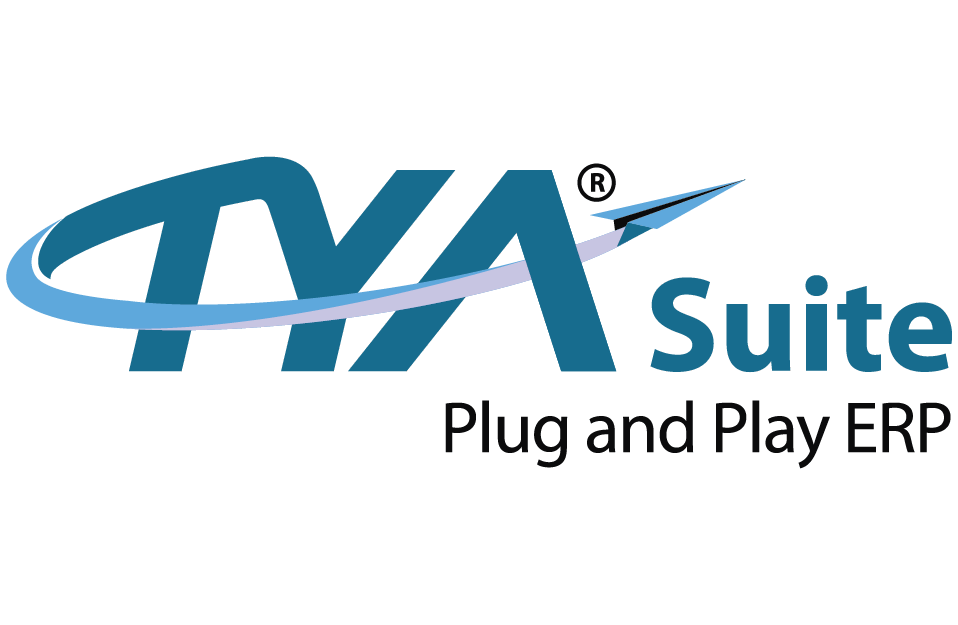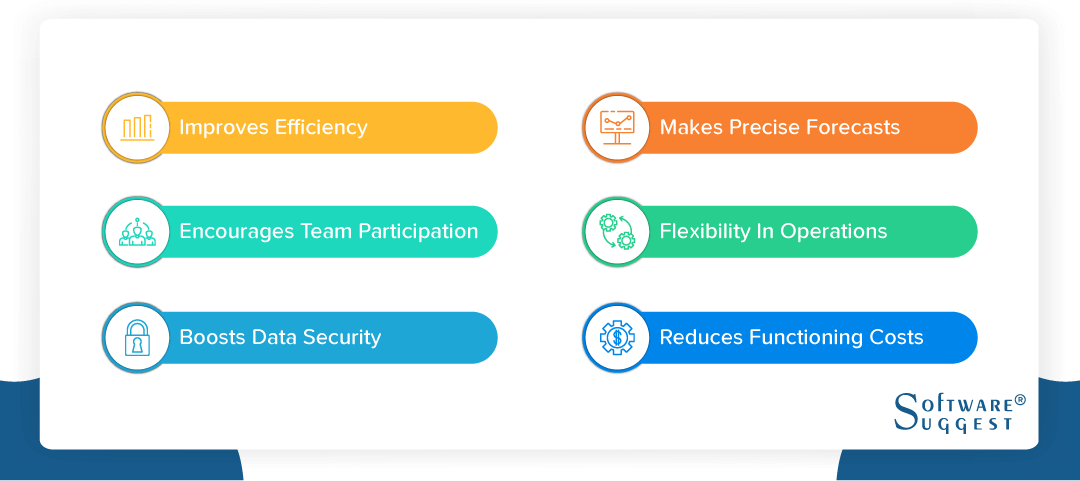Best ERP Software System
Best ERP software in India are Oracle NetSuite, Microsoft Dynamics, SAP ERP, TallyPrime, Vyapar, and Infor. ERP systems manage and simplify day-to-day business operations like financials, procurement, supply chain, manufacturing, and more.
What is ERP Software?
Enterprise Resource Planning (ERP) Software is a set of tools designed to integrate and streamline all essential business processes within an organization.



No Cost Personal Advisor
List of 20 Best ERP Software
Best-in-class Cloud Accounting & Financial Managem
Sage Intacct is a cloud-based financial statement solution designed for small and mid-sized businesses. This robust and innovative software automates critical finance and accounting processes besides providing users with real-time financial insights. Read Sage Intacct Reviews
Explore various Sage Intacct features, compare the pricing plans, and unlock the potential of seamless operations by selecting the right software for your business.
Features
View all Sage Intacct Features- Multi-Department/Project
- Duplicate Payment Alert
- Accounting Management
- Cash Management
- For Real Estate
- What If Scenarios
- Budgeting and planning
- Version Control
Sage Intacct Caters to
- StartUps
- SMBs
- Agencies
- Enterprises
All-in-one cloud business management solution
A comprehensive enterprise cloud solution designed to modernize your business operation. It is used to automate organization processes as well as day-to-day business operations. Read Oracle NetSuite ERP Reviews
Explore various Oracle NetSuite ERP features, compare the pricing plans, and unlock the potential of seamless operations by selecting the right software for your business.
- Manufacturing
- Fundraising Management
- Sales Quotes
- CRM
- Vendor Management
- Multi Location
- Email Integration
- Multiuser Login & Role-based access control
Oracle NetSuite ERP Caters to
- StartUps
- SMBs
- Agencies
- Enterprises
Powerful collaboration tool for teams of all sizes
Wrike is an online project management software that gives you complete visibility and control across your tasks. Online project management software to establish an advantage and align your team to work quick and active across your organization. Read Wrike Reviews
Explore various Wrike features, compare the pricing plans, and unlock the potential of seamless operations by selecting the right software for your business.
Features
View all Wrike Features- Time Clock
- Project Budgeting
- Forms Automation
- Task Management
- Collaboration Tools
- Product Management
- Data Mapping
- Roadmapping
Pricing
Wrike Caters to
- StartUps
- SMBs
- Agencies
- Enterprises
Development to Deployment DSLC, your scalability p
DSLC is a comprehensive platform for rapid application development on both the front and back end through drag-and-drop functionality with blockchain integration providing secure and scalable growth. Read Cyberium DSLC Reviews
Explore various Cyberium DSLC features, compare the pricing plans, and unlock the potential of seamless operations by selecting the right software for your business.
Features
View all Cyberium DSLC Features- Compatibility Testing
- Reporting/Analytics
- Collaboration Tools
- Access Controls/Permissions
- Debugging
- Code-free Development
- Software Development
- Custom Pricing Options
Pricing
Cyberium DSLC Caters to
- StartUps
- SMBs
- Agencies
- Enterprises

The Cloud ERP
Founded in 2008, Acumatica is a future-proof Cloud ERP solution for managing the complexities of distribution such as purchasing, ordering, tracking inventory, filling orders, and delivering customer support. Read Acumatica Reviews
Explore various Acumatica features, compare the pricing plans, and unlock the potential of seamless operations by selecting the right software for your business.
Features
View all Acumatica Features- Data Visualization
- Budgeting & Forecasting
- HR & Payroll
- Property Management
- Compliance Management
- For General Contractors
- Purchase Management
- Payroll
Acumatica Caters to
- StartUps
- SMBs
- Agencies
- Enterprises
Category Champions | 2024
Best ERP Systems for small and medium size businesses
As one of the best ERP system, Tally ERP 9 is the ideal business management solution and GST software for small and medium enterprises, combining functionality, control, and customizability. Read TallyPrime Reviews
Explore various TallyPrime features, compare the pricing plans, and unlock the potential of seamless operations by selecting the right software for your business.
Features
View all TallyPrime Features- Accounts payable
- Multi-Branch Connectivity
- Customer Management
- Live Chat
- Multi Location
- Service Tax
- Warehouse Management
- Statutory Capabilities
TallyPrime Caters to
- StartUps
- SMBs
- Agencies
- Enterprises
Emergents | 2024
Leading Cloud-Based ERP Software
The cloud-based leading ERP software, Infor CloudSuite Industrial (SyteLine), was created by the international software corporation Infor, which has its headquarters in New York City. It is made to meet the requirements of the manufacturing and distribution sectors, offering complete and integrated solutions to manage entire operations. Learn more about Infor CloudSuite
Explore various Infor CloudSuite features, compare the pricing plans, and unlock the potential of seamless operations by selecting the right software for your business.
Features
View all Infor CloudSuite Features- Order Fulfillment
- Inventory Management
- CRM
- Shipping Management
- Import/Export Management
- MES
- Electronic Data Interchange
- Purchase Order Management
Infor CloudSuite Caters to
- StartUps
- SMBs
- Agencies
- Enterprises
Contenders | 2024
Low-cost Enterprise Resource Planning System Software
Bigsun is a powerful enterprise resource planning system that offers comprehensive tools for managing core business processes. With modules covering finance, human resources, supply chain, manufacturing, and customer relationship management, Bigsun ERP enables organizations to streamline operations, improve efficiency, and make data-driven decisions. Bigsun offer affordable quality ERP Software services for small and medium-size businesses. Read Bigsun ERP Reviews
Explore various Bigsun ERP features, compare the pricing plans, and unlock the potential of seamless operations by selecting the right software for your business.
Features
View all Bigsun ERP Features- Dues Management
- Centralized Data
- Cash Management
- Maintenance Scheduling
- Finance & Accounting Management System
- Tax
- Bank Reconciliation
- Multi-Department / Project
Bigsun ERP Caters to
- StartUps
- SMBs
- Agencies
- Enterprises
Category Champions | 2024
All in One Solution for Enterprise Resource Planning
Leading construction management ERP system for civil contractors, electrical contractors, and government contractors. It offer an extensive range of technology services in construction & real estate industry for providing construction software Read Astral Construction & Real Estate ERP Reviews
Explore various Astral Construction & Real Estate ERP features, compare the pricing plans, and unlock the potential of seamless operations by selecting the right software for your business.
- Quotes / Estimates
- Purchase Management
- Property Alerts
- Residential Properties
- Billing & Invoicing
- MIS Reports
- Inventory control
- Task Management
Astral Construction & Real Estate ERP Caters to
- StartUps
- SMBs
- Agencies
- Enterprises
Category Champions | 2024
Best Enterprise Resource Planning Software in India
Invoicing, inventory management, accounting, and much more can be handled with Vyapar, a top ERP system software for small businesses. The purpose of Vyapar is to provide MSMEs with a simple way of managing everyday business operations. Read Vyapar Reviews
Explore various Vyapar features, compare the pricing plans, and unlock the potential of seamless operations by selecting the right software for your business.
Features
View all Vyapar Features- Native App
- Billing & Invoicing
- Budgeting
- VAT / CST / GST Reports
- Customer Management
- For Retail
- GST Ready
- GST Compatible
Pricing
Silver- Desktop (1 year)
$ 40
Device/Year
Silver- Desktop + Mobile (1 year)
$ 47
Device/Year
Silver- Desktop (3 years)
$ 92
Device/ 3 Years
Vyapar Caters to
- StartUps
- SMBs
- Agencies
- Enterprises
Category Champions | 2024
All in one Top ERP Software for Your Business
DataNote is an OpenLogic framework ERP system software provider and boasts of 15,000+ clients. It offers a fully integrated system covering ERP/financials, inventory, manufacturing, quality, sales, CRM, and more. Read DataNote Reviews
Explore various DataNote features, compare the pricing plans, and unlock the potential of seamless operations by selecting the right software for your business.
Features
View all DataNote Features- Plant Management
- Waste Management
- Private Cloud
- CRM Analytics
- Channel Management
- General Ledger
- Order Fulfillment
- CRM & Sales Dashboards
DataNote Caters to
- StartUps
- SMBs
- Agencies
- Enterprises
Category Champions | 2024
Best ERP Software to Manage Daily Operations
NetSuite ERP business software automates core processes and provides real-time insight into thousands of companies' functional and financial performance. NetSuite offers companies access to information and control operations with an integrated suite of accounting, inventory management, etc. Read Oracle NetSuite ERP Reviews
Explore various Oracle NetSuite ERP features, compare the pricing plans, and unlock the potential of seamless operations by selecting the right software for your business.
- Campaign Management
- Filtered Search
- Account Management
- Event Logs
- Online Booking
- Stock Taking
- ERP
- Contact Import/Export
Oracle NetSuite ERP Caters to
- StartUps
- SMBs
- Agencies
- Enterprises
Category Champions | 2024
SaaS solution with top ERP features & capabilities
It can empower your workforce to higher levels of productivity with the latest ERP software. Oracle ERP Cloud is the modern, cohesive, and total cloud application suite that handles products, procurement, and projects enterprise-wide. Read Oracle Fusion Cloud ERP Reviews
Explore various Oracle Fusion Cloud ERP features, compare the pricing plans, and unlock the potential of seamless operations by selecting the right software for your business.
- Business intelligence (BI)
- Risk Management
- Quality Management
- What-if Analysis
- Reporting
- Finance & Accounting Management System
- Financial Reporting
- Accounts payable
Oracle Fusion Cloud ERP Caters to
- StartUps
- SMBs
- Agencies
- Enterprises
Category Champions | 2024
Best ERP system for small businesses
ORION ERP is an integrated, cloud ERP software for growing and midsized firms. Using ORION Enterprise, organizations can seamlessly incorporate disparate teams, operations, processes, and systems, making it a dynamic enterprise resource planning solution. Read ORION ERP Reviews
Explore various ORION ERP features, compare the pricing plans, and unlock the potential of seamless operations by selecting the right software for your business.
Features
View all ORION ERP Features- Income Statements
- Receipt Management
- Report Export
- Compatible With Multi Operating System (Except MAC)
- Transportation Management
- Reseller Management
- Job Costing
- Expense Tracking
ORION ERP Caters to
- StartUps
- SMBs
- Agencies
- Enterprises
Contenders | 2024
Flexible Cloud-Based Platform for Enterprise Resource Planning
Ramco ERP system is a cloud-based ERP tool that lets companies access essential business data anytime and anywhere. Ramco ERP system replaces separate platforms and enables you to manage operations from one integrated platform. Read Ramco ERP Reviews
Explore various Ramco ERP features, compare the pricing plans, and unlock the potential of seamless operations by selecting the right software for your business.
Features
View all Ramco ERP Features- Quality Management
- Time Tracking
- Manufacturing
- Accounts payable
- Transport / Fleet management
- CMMS/EAM
- Field service management
- HR & Payroll
Ramco ERP Caters to
- StartUps
- SMBs
- Agencies
- Enterprises
Category Champions | 2024
Robust enterprise resource planning system
As an all-in-one, cloud-based ERP software for managing finances, operations, sales, and customer service, Microsoft Dynamics 365 Business Central allows customers to move from entry-level top ERP systems to one comprehensive, all-encompassing solution. Read Microsoft Dynamics 365 Business Central Reviews
Explore various Microsoft Dynamics 365 Business Central features, compare the pricing plans, and unlock the potential of seamless operations by selecting the right software for your business.
- Field service management
- Project Management
- Operations Management
- CRM
- Service Management
- Manufacturing
- Sales Management
- Invoicing
Pricing
Basic
$ 24
User/Month
Microsoft Dynamics 365 Business Central Caters to
- StartUps
- SMBs
- Agencies
- Enterprises
Contenders | 2024
Empowered Cloud ERP Software Vendor
TYASuite is a comprehensive ERP solution that integrates essential processes such as finance, supply chain, manufacturing, human resources, and customer relationship management into a unified platform. It has features like real-time analytics, workflow automation, and customizable modules to streamline operations and drive efficiency. TYASuite is designed to meet the diverse needs of modern businesses, helping them make informed decisions, optimize resources, and achieve sustainable growth. Read TYASuite Reviews
Explore various TYASuite features, compare the pricing plans, and unlock the potential of seamless operations by selecting the right software for your business.
Features
View all TYASuite Features- Inventory control
- Fixed Asset Management
- Compliance Management
- Finance & Accounting Management System
- Sales Management
TYASuite Caters to
- StartUps
- SMBs
- Agencies
- Enterprises
Emergents | 2024
Easy to use ERP Software
UniERP software is a versatile enterprise resource planning solution designed to streamline business processes and enhance operational efficiency. It has features like finance, HR, supply chain, manufacturing, and CRM, UniERP provides organizations with a centralized platform for managing key functions. Its user-friendly interface and customizable features make it suitable for businesses of all sizes and industries. Read UniERP Reviews
Explore various UniERP features, compare the pricing plans, and unlock the potential of seamless operations by selecting the right software for your business.
Features
View all UniERP Features- Bill of materials (BoM)
- Inventory Management
- Warehouse Management
UniERP Caters to
- StartUps
- SMBs
- Agencies
- Enterprises
Contenders | 2024
Leading web-based ERP System
Banibro's end-to-end ERP system solution is specifically designed to automate and ease day to day activities of small and medium-sized businesses. With features tailored to various industries, Banibro ERP enhances productivity and drives growth for businesses of all sizes. It holds expertise in developing mobile and web applications as well. Read Banibro ERP Reviews
Explore various Banibro ERP features, compare the pricing plans, and unlock the potential of seamless operations by selecting the right software for your business.
Features
View all Banibro ERP Features- Appointment Management
- Supply Chain Management
- Costing
- Budget Management
- Labor Cost Calculator
- Access Controls/Permissions
- Barcoding
- Account Management
Banibro ERP Caters to
- StartUps
- SMBs
- Agencies
- Enterprises
Contenders | 2024
AI-powered System for Enterprise Resource Planning
ProQsmart is an AI-powered comprehensive enterprise resource planning platform that provides manufacturing companies with a seamless procurement experience. It simplifies and streamlines the entire procurement process, saving time, reducing costs, and improving collaboration. Read ProQsmart Reviews
Explore various ProQsmart features, compare the pricing plans, and unlock the potential of seamless operations by selecting the right software for your business.
Features
View all ProQsmart Features- Supplier and Purchase Order Management
- Rfx Management
- Supplier Management
- File Sharing
- Online Auction
- Vendor Management
- Supplier Qualification
- Bidder Management
ProQsmart Caters to
- StartUps
- SMBs
- Agencies
- Enterprises
Until 30th Apr 2024

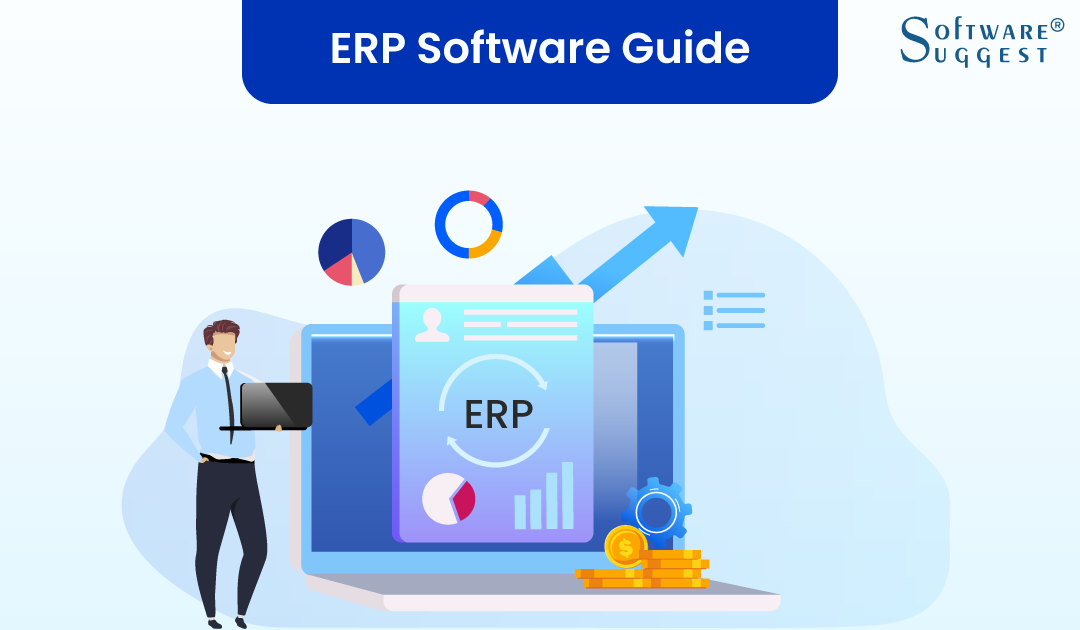
ERP software can reduce manual entries, centralize data, and make it visible to shareholders and your teams.
ERP software, also known as Enterprise Resource Planning Software, manages the daily business operations of organizations by merging every data into a single source of truth. An enterprise resource planning tool blends multiple business processes.
Understanding an ERP tool and its role can help businesses plan better and invest in the best ERP provider to improve business performance. The best choice for organizations is to enhance bottom-line results and gain a competitive advantage.
Types of Enterprise Resource Planning Software
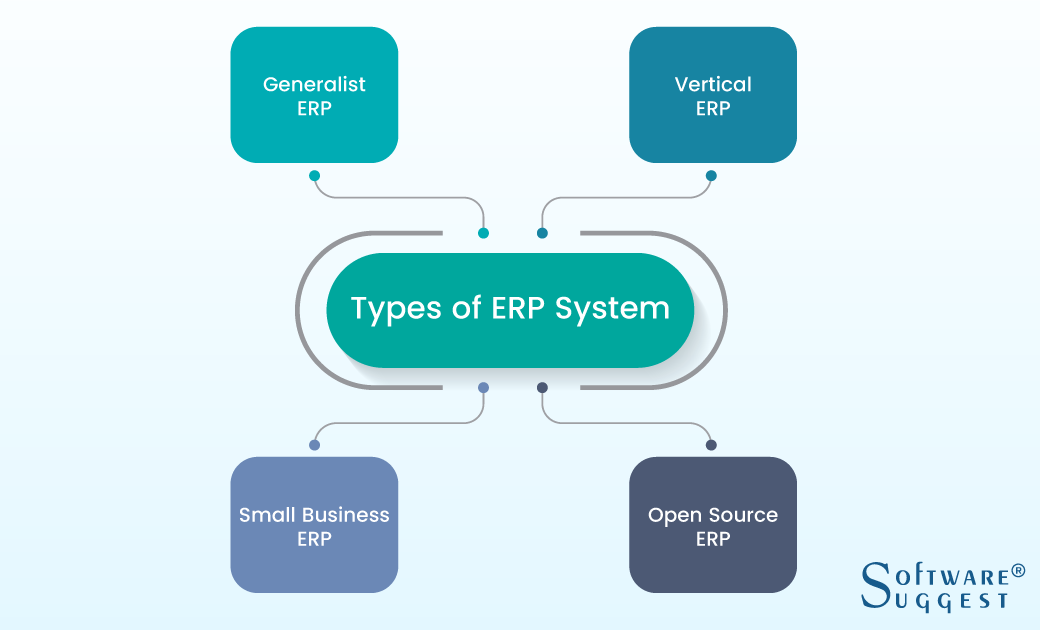
It varies depending on the industry focus, systems, and features. They are grouped as per functional levels, business size, and deployment. Here is, a list of common types of ERP software.
- Generalist: It is one of the essential types of enterprise resource planning tools as it offers broad applications. It adapts to different processes across industries. It can be customized and integrated according to industry requirements. NetSuite ERP is an example of a Generalist ERP solution.
- Vertical: The industry-specific best ERP platform usually focuses on a niche within the industry. Start-ups and small businesses that concentrate on the broader industrial markets like retail fashion or supermarket distribution use it. An example of a Vertical ERP solution is Microsoft Dynamics ERP.
- Small Business: It refers to on-premise fast ERP solutions. Small business ERP solutions generally focus only on processes that would affect an average start-up or a company with few employees. As a result, they concentrate only on some data types while ignoring the rest. For instance, it only features supply chain management and order processing functions, whereas it offers HRM and accounting as add-on options. Due to this functionality, it is also called lightweight ERP.
- Open Source: It is a small part of the ERP market. It allows core software to be modified. Individual developers can add it when they create new modules and functions. As companies can customize it as per needs, it is widely adopted. Companies preferring a collaborative approach to development also tend to use open-source ERP solutions.
What are the Benefits of ERP Software?
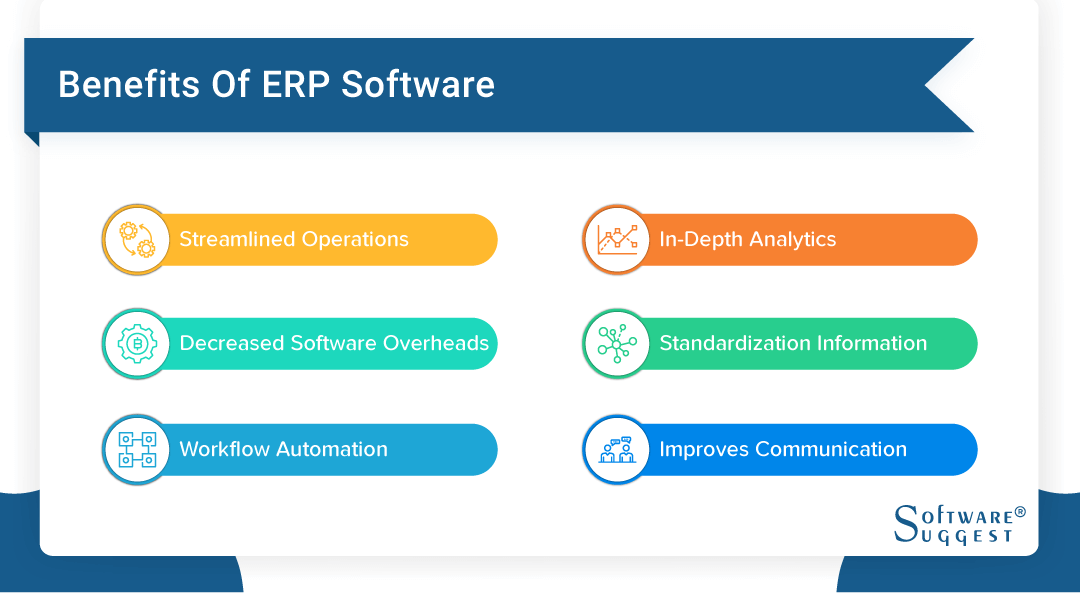
Best ERP software provides many advantages to a business. It includes:
-
Streamlined Operations
ERP software stores data across an organization. From a company warehouse management to its administration, it keeps track of all the data. Though default packages include most of the functions, They also support third-party integrations. Thus, it streamlines business processes.
-
Decreased Software Overheads
As ERP tools allow companies to consolidate other tools, they can free themselves from handling separate software for HR Management, CRM, supply chain management, and other tasks through a centralized system. So, a company can cut down on monthly overheads due to disparate software system subscriptions based on its needs.
-
Workflow Automation & Enhanced Accessibility
With the help of artificial intelligence and natural language processing technologies, modern enterprise resource planning tools can automate business routines like customer service, project management, and more. As a result, it helps companies free up human resources to focus on more complicated tasks.
Present-day ERPs also provide cloud-based options and IoT functionalities to offer unparalleled access to everyday business operations. Users can access, retrieve, and modify the information in real time.
-
In-depth Analytics
Unlike other standalone systems, top ERP software provides detailed data analytics from across an organization. It offers insights and granularity of business processes via an intuitive dashboard.
-
Standardization of Human Resources Information
Many ERP solutions offer core HR functions like payroll, scheduling, time, and attendance management. Besides, the managers can view employees' information while creating schedules. Thus, it connects an organization's human resources with enterprise data.
-
Improves Communication
As ERP tool make complete business data available in a single place, the company employees can gather to plan and track business events. For example, many systems allow employees to create progress reports, indicate inventory levels, and notify colleagues.
They can act as a source of truth for stakeholders to compare successes and plan bumps in the road ahead.

-
Improves Efficiency
With the integration of many business processes like marketing, production, accounting, inventory, and more into ERP tools, it becomes easy for an organization to gather, access, and retrieve information across the organization. It also streamlines workflow across different departments.
It automates day-to-day tasks like generating reports, making data entries, and more. Hence, it frees your human resources from repetitive tasks and enables them to concentrate on core deliverables. Besides, an intuitive dashboard that accredits managers and key stakeholders to look at the key performance indicators across the organization quickly.
-
Encourages Team Participation
Top ERP software centralizes employee data within an organization and bridges the gap between departments. It helps employees collaborate conveniently with different teams incorporated into the enterprise resource planning. Furthermore, SaaS-based platforms unite remote units and the headquarters via the Internet.
-
Boosts Data Security
ERP platform is developed to protect a company's data against breaches. It possesses firewalls and restriction controls that ensure the data stays protected. Furthermore, as the ERP platform features a single data warehouse, access point monitoring becomes strict. Hence, security remains concentrated.
It offers the admin the flexibility to lock sensitive data and increase data security so that user access permission to other information is not affected. Admin can deactivate terminated employees' access while granting access to the new joiners. Moreover, it displays the user's activities and allows the admin to spot any illegal actions taking place in the company.
-
Makes Precise Forecasts
Organizations can develop strategies and make firm decisions based on accurate forecasts. Enterprise resource planning tools work with a single data repository and standardize business processes through advanced reporting tools. These reporting tools make use of filters and analytics to eliminate inconsistencies in the collected data.
-
Expands Flexibility in Operations
Most enterprise resource planning software allows companies to integrate existing apps or export the data to other apps to streamline business processes. This tool also offers the option to add modules as the business grows.
Thus, it prevents companies from replacing the system with new software. Moreover, connecting enterprise resource planning to the internet allows access whenever and wherever from any device.
-
Reduces Functioning Costs
This system permits engineering, manufacturing, customer service, and other departments to work closely in real-time. Thus, problems can be solved mutually in no time. It keeps the operating costs in the budget.
It streamlines different processes and monitors vital metrics while avoiding disruptions and delays. Further, ERP platform providers take into consideration any technical issues. Hence, it saves maintenance costs.
What are the Key Features of ERP Software?
Though ERP software is brimming with innovative features to help businesses, some key functionalities are useful for most organizations.
-
Real-time generation of data for better management facilities.
-
Detailed analysis, forecasting, and report generation schemes for critical monitoring and research options.
-
Dedicated modules for financial management, human resource management, inventory management, etc.
-
User-friendly interface with effective and straightforward steering systems for monitoring user productivity.
-
Boundless integrated database management options with easy query retrieval and update solutions.
-
Cross-platform synchronization for better usability over varied interfaces.
-
Highly secure systems for safe transactional operations.
-
Easy creation of master data for more significant insights into the various operations.
-
Proper full-time customization of widgets and different integral functionalities effective visualization of departmental and employee performance.
-
24/7 customer support solutions for greater customer satisfaction and retention on the whole.
How to Choose the Right ERP Software System?
Buying ERP software can be a complicated thing as it involves customization requests and uncertain vendor capabilities. So, taking the following factors into account can benefit you.
-
Business Requirements
The most crucial step in the enterprise resource planning decision process is assessing how the functionality of software products and services fits with your company. Examining top enterprise resource planning tools, viewing ERP demos, meeting with solution experts, and determining the greatest functional compatibility.
One of the most beneficial things you can do while selecting ERP software is to simplify internal communication to identify your company's business requirements for enterprise resource planning and the functional areas to focus on. -
Return on Investment
Tally up all the expenses you need to incur for the ERP solution. Consider the purchase price and the initial consulting costs. Your servers and networks might constantly require changes. While implementing ERP, you will have to cover costs for training and temporary staff. You incur support and maintenance charges yearly if you utilize ERP software.
Owing to the ERP, you offer your consumers services and goods that were previously impossible, resulting in increased revenues.
-
Industry Specific
Specific manufacturing ERP solutions are tuned to work best in sectors like manufacturing and distribution. You need to consider it while purchasing an ERP. It'll help you reconsider the packages. The implementation partner and software vendor must be specific to your industry needs.
-
Upgrade or Replacement:
Before you decide to buy a new system, verify if your existing system requires a replacement or just an update. Many ERP solutions available nowadays allow you to integrate new modules without causing any disruption in the current system. This practice also reduces costs.
If your current system is about ten years old, it is prudent to replace it. Instead, you can leverage a new ERP tool that offers better scalability, mobility, integration, and deployment options.
-
Training & Setup:
Installing an on-premise enterprise resource planning tool requires a company to have someone with technical know-how. If your company has no professional team, ensure that you understand the service level agreement correctly because installation charges are often levied separately.
Installing an enterprise resource planning solution is more complicated as compared to other business solutions. So, it needs user training. Make sure that you receive training that suffices average users need to adapt to the system.
-
Reporting & Dashboard:
Today’s ERP solutions offer advanced reporting tools that create compliant financial statements depending on your region. The latest ones also include in-system queries and smart filters that come with real-time data. Similarly, agile and ad hoc reporting lets you quickly adjust to evolving business needs and disruptions.
The intuitive dashboards provide insight into the user's qualitative and quantitative data at the role and departmental level.
-
Integration & Customization:
It will work seamlessly with your existing applications. You must check its system-to-system, module-to-system, and file transfer capabilities. Culture and priorities differ from one department to another. For example, the marketing department spends whereas the accounting department saves. Likewise, the production department keeps up with daily output, while the sales department needs a monthly quota. So, it is wise to select a top ERP tool that offers customizable tools and configurable workflows.
Challenges Faced While Implementing ERP Software
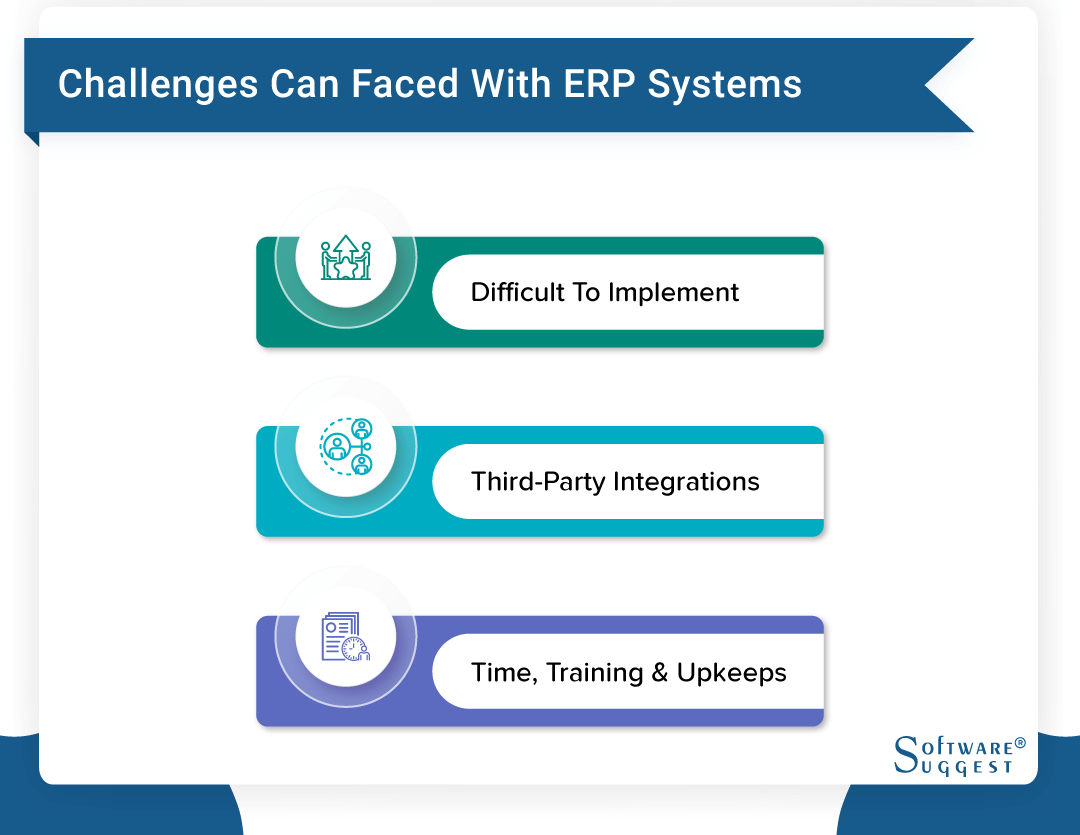
Although the perks of ERP solutions are substantially solid, there are certain shortcomings too. Below are some potential issues found with the enterprise resource planning tools:
- Difficult to Implement an Overarching Infrastructure: For large corporations with branches at different locations, It is difficult to adopt a uniform ERP solution. Say that the culture, rules, and regulations may vary from one office to another. Making it challenging to implement an ERP tool in overarching infrastructure. As a result, it is either less adopted or remains deserted.
To solve organizational complexities, many companies are approaching two-tier enterprise resource planning, i.e., headquarters will use corporate enterprise resource planning, whereas branches will use another system.
- Not All ERPs Allow Full Third-party Integrations: If a business uses a pool of applications, finding a fully integrated quick-install ERP solution is a daunting task. To incorporate the existing applications or systems, the company requires assessing ERP integration for each app. It is a time-consuming process.
It is better to get the platform with an open API, ensuring that the developer can modify the system to integrate the current apps.
- Time, Training, and Upkeeps: Since ERPs deal with several modules and corresponding features, your employees may take a certain amount of time to learn and master them. Moreover, during any update in the software itself, which can frequently happen with specific software, you can neither add data nor view it. This can cause grave problems for a business.
Common Myths About ERP System
ERP system is gaining popularity among businesses. However, many myths surround the implementation of an ERP tool. Let’s break those common myths today.
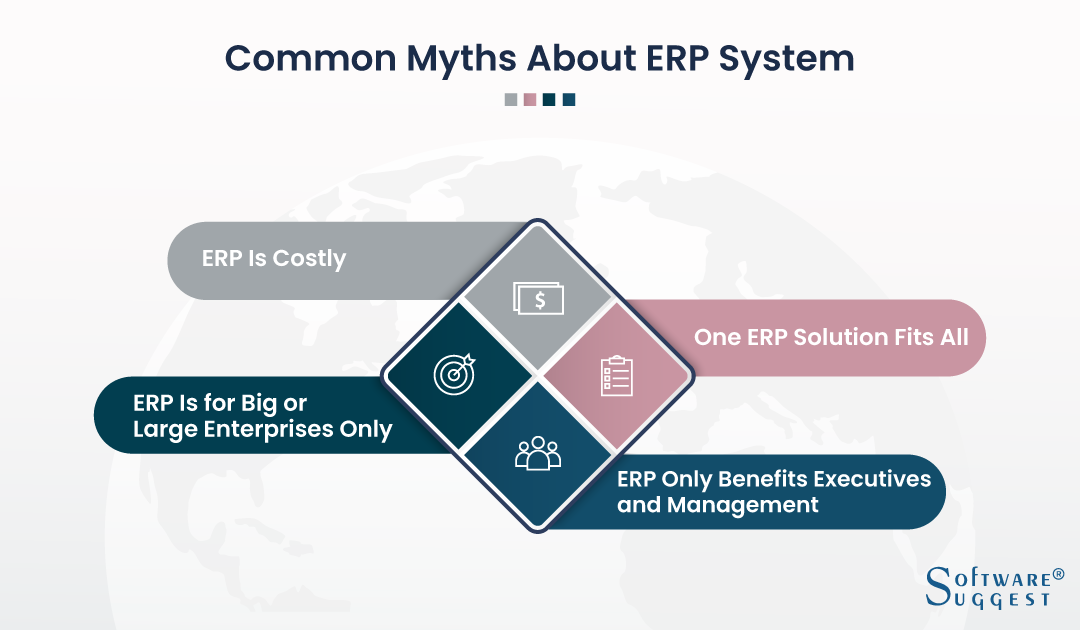
Myth #1: ERP Is Costly
You will find a range of enterprise resource planning tools designed to serve different sizes and industries. Don’t necessarily get confused that expensive ones are better than low-priced ones. However, your focus should be on getting a comprehensive system that fits your company’s needs.
Even if it seems costly, the investment will only reap benefits for you in the future. Your return on investment (ROI of enterprise resource planning) depends on the overall value derived from the system over time.
Myth #2: One ERP Solution Fits All
Certainly, not true.
Each enterprise resource planning tool is unique in its applications and interface. It’s essential to compare ERP solutions and select the best fit for your business requirements.
The need for a company that manufactures a variety of products will undoubtedly differ from those that produce only one product. Besides, the food and beverage industry's needs will vary from those of electronic device-making enterprises.
The functionalities and capabilities of an ERP tool vary depending on the various business needs.
Myth #3: ERP Is for Big or Large Enterprises Only
When ERP was first introduced, it was solely for the big enterprises in the market. However, things have changed, and vendors are coming up with ERP solutions for small businesses too.
ERP tools come in various shapes and sizes. Selecting the right ERP software is essential for longevity and effective implementation.
Myth #4: ERP Only Benefits Executives and Management
An enterprise resource planning tool in place benefits every employee involved in the organization. It provides vital information to the upper management for decision-making. Besides, it automates the workflows between departments which results in widespread sharing of information. The advantage of it is that you will have improved project planning and lower purchase costs.
Trends and Future Predictions in ERP Software
ERP software industry revenue is projected to hit 62.3 billion USD by 2028. This would represent a CAGR of 4.5% from 2024 to 2028 from the current size of the market at approx. 52.3 billion USD in 2024. This growth is in line with the digitization of business, using tools to optimize day-to-day business activities. ERPs are equipped with modules from accounting to project management, making them almost ubiquitous for all organizations.
Trends tend to follow the latest developments in technology. Here, we have compiled some significant ERP trends that are observed among the ERP vendors.
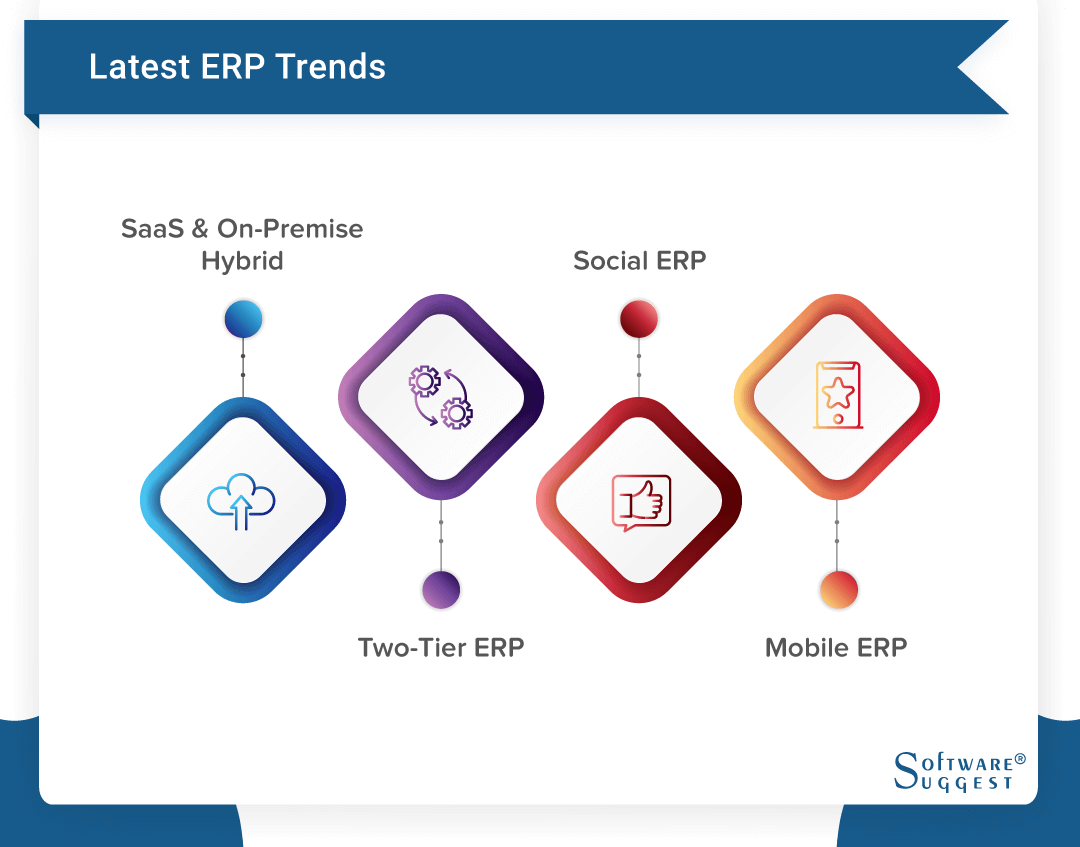
- SaaS & On-Premise hybrid: Many companies prefer a hybrid approach, i.e., integrating on-premise software into the cloud platform. Let’s say integrating cloud payroll into local HR-focused ERP. In the context of cost and process, this strategy seems meaningful. Thus, vendors tend to offer hybrid ERP software. For instance, instead of replacing its on-premise licensing, Oracle is co-opting it with cloud solutions.
- Two-tier: Two-tier ERP involves two systems in a single company. Most multinational companies are moving towards this approach where tier 1 is used at the corporate level, and tier 2 is used at the branch/subsidiary level. This strategy proves helpful when big corporations find it difficult to implement an overarching infrastructure due to cultural, geopolitical, and market differences.
- Social: Social enterprise resource planning is used to add data from social media platforms like Twitter and Facebook into the system. It is a CRM initiative as most businesses are involved in online customer engagement, brand mentions, friend networks, public data, likes, and shares to obtain customer knowledge. It helps them improve conversion rates.
- Mobile: Some ERP solutions provide native apps for Android, iOS, and Windows. It allows employees to stay connected and productive even outside the office. But, accessing data anywhere on a device that is not issued by the company is prone to a security breach. Mobile enterprise resource planning solves this issue by providing separate user permission that helps the company control who can access data on their phones.
Top-rated ERP Software at a Glance:
Check exclusive list of best erp software as per SoftwareSuggest Leaders Matrix
-
Best erp software for small businesses: Oracle Netsuit ERP
-
Best erp software for enterprise businesses: Oracle Netsuit ERP
-
Best erp software for freelancers: Medicin erp distributor
-
Best erp software for startups: Banibro ERP
ERP Related Resources:
- Track and Record Business Assets by using ERP Software in the UAE
- The Right Way to Invest in A New ERP Software
- ERP Data Migration: Checklist, Best Practices, and Pro Tips
- 9 Best ERP Systems in South Africa
- ERP-integrated E-commerce: Types, Benefits, And More
- EDI in ERP: Why It’s Important to Your Business
- ERP Digital Transformation: Revolutionize Your Business Processes
- ERP in Production Planning: The Future of Manufacturing Industry
- ERP and PLM: Complementary Systems Drive Manufacturing Process
- Odoo Vs. SAP Vs. Oracle ERP: A Comparative Guide
- ePROMIS vs. Oracle Fusion vs. Oracle Netsuite vs. SAP S4HANA vs. Microsoft Dynamics 365
- Top 10 Free and Open Source ERP Software for Business
- Common ERP Security Issues and How To Fix Them
- ERP for Automotive Industry: A Comprehensive Guide
- How Much Does ERP Software Price?
- ROI of ERP System: How Businesses Get a High ROI by Implementing
- A Comprehensive Guide on ERP Database Design and Management
- Travel ERP Software: A Perfect Solution for the Travel Industry
- What is the ERP Finance Module? Benefits, Features, & Examples
- Tips to Set up and Develop a Realistic ERP Project Plan
- What are the Differences Between SaaS ERP and Cloud ERP?
- Top 20 Examples of ERP Systems
- ERP Components: Key Elements of Enterprise Resource Planning System
- The Ultimate ERP Evaluation Guide (With a Free Template)
- Role of ERP in Human Resource Management and its Importance
- ERP and WMS: Which is Better for Your Business?
- ERP Upgrades: Benefits & Tips for Upgrading your ERP
- Top ERP Trends for 2024: Future of ERP
- What Is Cloud ERP Software? Types, Components, And Benefits
- 15 Best ERP System For Startups In 2024
- ERP Logistics: A Definitive Guide For 2024
- ERP In The Construction Industry- A Complete Guide in 2024
- ERP vs MRP: Differences, Benefits, And More
- Top 12 ERP Software Selection Criteria to Consider
- 15 Best ERP Software Companies for 2024
- ERP in Supply Chain Management: A Detailed Guide
- ERP vs. BI: Key Differences & Benefits
FAQs
Tracking products through each stage of the supply chain is a critical component of regulatory compliance in the manufacturing business. Inventory tracking and supply chain components in ERP software help ensure that items are in top shape from raw material procurement through distribution and everywhere.
Yes, ERP software can be accessed remotely. ERP software updates data in real time, and reports can be created and accessed remotely using Cloud-based ERP software.
By making supply chain processes flexible, effective, and simple to manage, ERP software improves them. These technologies assist companies in integrating information gathered across the entire supply chain, streamlining and automating important activities, and gaining greater supply chain awareness to increase productivity while responding to problems.
- Set up the API token for your ERP and any other systems you integrate.
- Create flows that specify how your ERP interacts with other applications.
- Build pipe connections in the systems that are linked.
- Establish mapping and modifiers.
- Configure the sync schedule and frequency.
ERP analytics collects and analyzes customer data to better understand customers' wants and make more informed decisions. It provides beneficial information about consumer behavior, such as the items they choose to buy and their perceptions of marketing, sales, and support offers.
By Countries
- United Arab Emirates
- Argentina
- Australia
- Bangladesh
- Bahrain
- Canada
- Germany
- Egypt
- United Kingdom
- Hong Kong
- Indonesia
- Ireland
- Jordan
- Japan
- Kenya
- Kuwait
- Sri Lanka
- Malta
- Mexico
- Malaysia
- Nigeria
- Nepal
- New Zealand
- Oman
- Philippines
- Pakistan
- Portugal
- Qatar
- Romania
- Saudi Arabia
- Singapore
- United States
- South Africa
By Cities
By Industries
- Agriculture
- Architecture
- Construction
- Consulting
- Distribution
- Education
- Engineering
- Food & Beverage
- Government Agencies
- Healthcare
- Hospitality
- Insurance
- Manufacturing
- Media & Newspaper
- Nonprofit
- Oil & Gas
- Pharmaceuticals
- Real Estate
- Retail
- Transportation
- Telecommunications
- Farming
- Trading
- Chemical
- Textile
- Financial
- Plastic
- Service
- Apparel
- Garment
- Fashion
- Automotive
- FMCG
- Logistics


.png)




.png)









